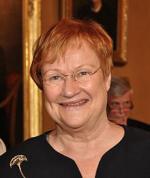Disable ads!
Tarja Halonen
Tarja Kaarina Halonen ([tɑrjɑ kɑːrinɑ hɑlonen] ( listen); born 24 December 1943) is a Finnish politician who was the 11th President of Finland, serving from 2000 to 2012. She was the first female head of state in Finland and while she was in office, in 2003 and 2010-11, Finland also had female prime ministers (Anneli Jäätteenmäki and Mari Kiviniemi). Halonen held two appointments as a minister and served as a member of the parliament from 1979 to 2000 until her election to the presidency. In addition to her political career, Halonen had a long and extensive career in trade unions and different non-governmental organizations. Her work for advancing human rights has been notable. She was, among other things, an early proponent of gay rights, chairing the main Finnish gay rights organization Seta in 1980-1981. Halonen rose from humble beginnings, having lived through the wartime as a daughter of a single mother in the Kallio working-class neighborhood in Helsinki. She graduated from the University of Helsinki, where she studied law from 1963 to 1968. She was active in student politics and served as the Social Affairs Secretary and Organization Secretary of the National Union of Students from 1969 to 1970. In 1971 she joined the Social Democratic Party and worked as a lawyer in the Central Organisation of Finnish Trade Unions until she was elected to parliament in 1979. Halonen served in the parliament of Finland for six terms, from 1979 to 2000, representing the constituency of Helsinki. She also had a long career in the city council of Helsinki, serving there from 1977 to 1996. She started her campaign for the presidency at the beginning of 1999 after President Martti Ahtisaari announced that he would not stand for a second term in the office. She easily won her party's nomination, and eventually got 40% of the votes in the first round of the presidential elections, and 51.6% in the second, thus defeating the Centre Party's Esko Aho and becoming the 11th president of Finland. During her presidency, she was extremely popular among Finns: her approval ratings rose and reached a peak of 88% in December 2003. Even though her ratings were so good, she was re-elected not in the first round in the next presidential elections in 2006 but only in the second round, against National Coalition Party candidate Sauli Niinistö by 51.8%-48.2%. Ineligible to run in the 2012 presidential elections because of term limits, Halonen left office on 1 March 2012 and was succeeded by Niinistö. Halonen is widely known for her interest in human rights issues. In 1980–81 Halonen served as the chairman of Seta, the main LGBT rights organization in Finland. During her presidency, she has participated actively in discussion of women's rights and problems of globalization. In 2006, she was mentioned by many sources as a potential candidate for the United Nations Secretary-General selection, but later she stated that she wanted to finish her term as president before thinking about other career options. Halonen is a member of the Council of Women World Leaders, an international network of current and former women presidents and prime ministers whose mission is to mobilize the highest-level women leaders globally for collective action on issues of critical importance to women and equitable development. Halonen is a Board of Trustees Member of the Nizami Ganjavi International Center, an international intercultural organization based in Baku, Azerbaijan promoting tolerance, dialogue, learning and understanding. In 2009, Forbes named her among the 100 Most Powerful Women in the world.
 Read more on wikipedia.org Read more on wikipedia.org
 All quotes by Tarja Halonen All quotes by Tarja Halonen
 Edit Edit
|

|
|
|
|
|
Background photo by Giuliana
|